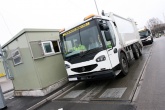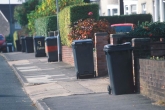HWRCs considered non-essential by local authorities in SUEZ poll
A poll by SUEZ recycling and recovery UK during a webinar has found that no local authority representatives found a trip to a Household Waste and Recycling Centre (HWRC) an ‘essential trip’ for householders during the Covid-19 pandemic.
The poll was conducted on 16 April during a webinar with 128 local authority representatives on the safe operation of HWRCs.
HWRCs have been one of the largest waste casualties during the Covid-19 pandemic, with 90 per cent of councils closing their HWRCs due to issues with staffing levels and social distancing measures.
 However, the Department for Environment, Food and Rural Affairs (Defra) is keen for HWRCs to reopen to allow residents to dispose of bulky waste, after reports last week of increases in fly-tipping. Defra had previously listed HWRCs as a ‘medium priority’ service, despite the mass closure of facilities.
However, the Department for Environment, Food and Rural Affairs (Defra) is keen for HWRCs to reopen to allow residents to dispose of bulky waste, after reports last week of increases in fly-tipping. Defra had previously listed HWRCs as a ‘medium priority’ service, despite the mass closure of facilities.
And councils present at the SUEZ webinar appeared steadfast in their belief that closing HWRCs is the correct move, with 100 per cent of those present considering a trip to a HWRC non-essential when asked at the end of the webinar – up from 89 per cent at the start.
The vast majority of councils present (90 per cent) felt the only way a trip to a HWRC could be considered as accessing a critical public service would be if food and general waste could not be collected from households.
A report by SUEZ on reopening HWRCs last week noted that any reopening of HWRCs during the pandemic would likely ‘demand resources to be withdrawn from supporting essential kerbside collections’.
As evidenced by the number of closures, councils are prioritising kerbside collections over HWRCs. Lee Marshall, CEO of the Local Authority Recycling Advisory Committee (LARAC), stated: If you consider the public health duties local authorities have, kerbside collections are a safer way of maintaining social distancing and ensuring suitable provision of waste services to residents than a major reopening of HWRCs.”
Again, the vast majority (97 per cent) of local authorities present at SUEZ’s webinar felt that they would not be able to maintain adequate social distancing and void congestion if HWRCs were reopened. If they were to reopen, bulky waste and garden waste would be prioritised by 72 per cent of councils present.
Commenting on the findings, John Scanlon, SUEZ CEO, said: “If there is a need to re-open a limited number of strategically located HWRCs in order to ease any pressures on household collection services, we will ensure those facilities operate in line with Public Health England guidelines, which will mean limiting the number of vehicles and people who can attend at any one time, restricting their capacity by at least 50 per cent to maintain social distancing.
“If any do re-open, we urge the public that a trip to their local recycling centre under a restricted service should remain something that must be only strictly necessary and cannot be used as diversionary trip or because people feel unable to responsibly store toys, clothes or electrical goods that they have decided to throw-away as part of a lockdown induced spring-clean at home.
“Non-essential clear-outs and associated trips to the HWRC must remain just that for now and be avoided. With HWRCs and charity shops closed and bring banks full, it is time for people to think before they discard, and store or re-use items at home.”










